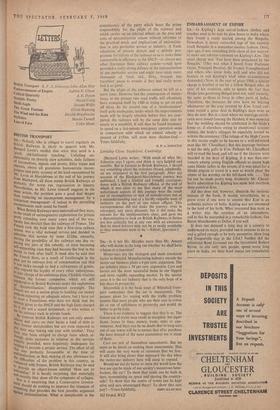SIR,—Is it not Mr. Marplcs more than Mr. Amory who
will decide in the long run whether we shall have a boom or a recession?
Motor-cars are the strongest and most consistent factor in demand. Manufacturing industry outside the motor-car business plans a 4 per cent. expansion. The car industry plans a 50 per cent. expansion. Cars and lorries are the most successful items in our biggest and most rapidly expanding market. In the special areas it is the car industry that is the only hope of a fair share in prosperity. Meanwhile it is the basic tenet of Whitehall trans- port authorities that the car is uneconomic. The present plans for coping with the traffic problem assume that most people who use their cars in towns do so out of selfishness or perversity and would do better to go by train.
There is no evidence to suggest that that is so. The forced use of trains may result in marginal, but signi- ficant, losses in time, money, trade, sales or con- venience. And there can be no doubt that to keep cars out of our towns will be to ensure that after purchase the least instead of the most economical use is made of them.
Cars are not of themselves uneconomic. But we seem to be intent on making them uneconomic. This will cause the very waste of resources that we fear. It will also bring closer than necessary the day when the motor-car industry here will cease to expand. Would we not do better to show the world how the best use can be made of our society's monstrous bene- faction, the car? To show that roads can be built in tiers, economising on space and sparing the country- side? To show that the centre of towns can be kept alive and cars encouraged there? To show that cars
163 Strand, WC2










































 Previous page
Previous page